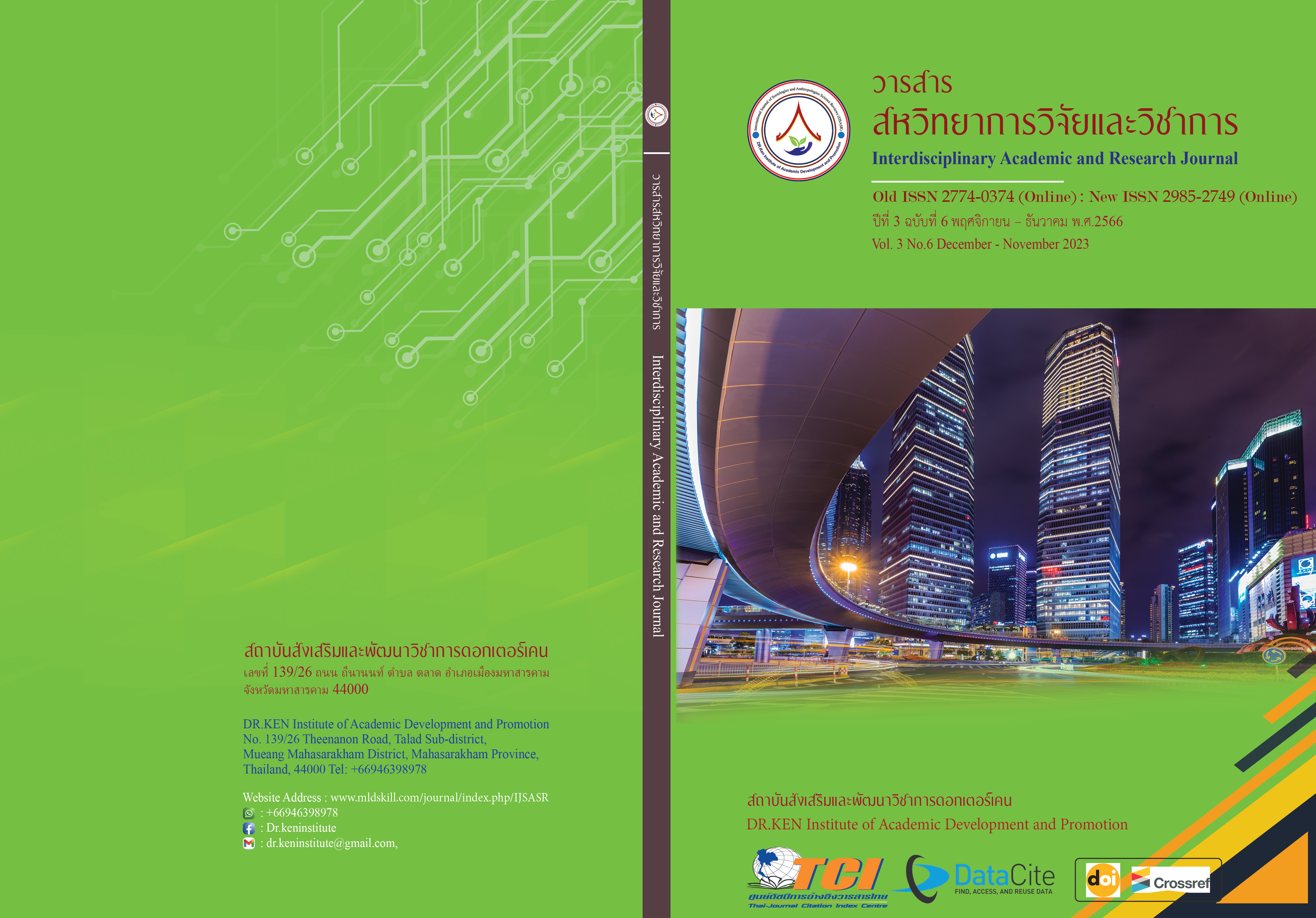Performance of Chief of Staff in Digital Age
DOI:
https://doi.org/10.60027/iarj.2023.271465Keywords:
Work Performance; , Village Chief; , Village Head;, Digital AgeAbstract
Background and Aims: Village chiefs and village heads are positions that play an important role in regional administration. This is because it is the last government agency to bring the policies and work of each ministry and department to the people. It is also the first unit to bring the needs and facts of the people to government service. The Village chiefs and village headmen have the same duties as other rulers to "cure suffering and maintain happiness" for the people. The Local Government Act, B.E. 2457, amended by the Local Government Act (No. 11), B.E. 2008, stipulates that the Village chiefs and village headmen are the assistants to the district chief in performing their duties and are the heads of the people in the village, in this regard, the village headman shall hold the position of a government official who performs duties in maintaining peace and order and maintaining internal security.
Methodology: This study used document analysis and related research methods. Analyze the content and present it descriptively according to the study objectives.
Results: the important duty of Village chiefs and village heads, therefore, strict control measures have been established, such as disciplinary punishment as well as civil servants. It can be considered that spatial management factors are important and extremely valuable. The operational competency of Village chiefs and village headmen in the digital era should have 3 competencies, namely; (1) Core Competency consists of; Governing and maintaining peace and order, economic development and social development, Facilitating the termination of death for the people, and Service. (2) Job Competencies are coordination. And (3) Functional Competencies are having a variety of knowledge and skills to make the village headman's work more efficient and effective.
Conclusion: The main responsibilities of village leaders and heads include setting strict control measures and overseeing discipline, similar to disciplinary actions for government officials. Key territorial management factors are crucial, and leaders in the digital age should possess three competencies: Core Competency, encompassing governance, maintaining peace, economic and social development, and providing ethical guidance to the public; Job Competencies, involving coordination; and Functional Competencies, requiring diverse knowledge and skills for effective and efficient leadership and performance.
References
กรมการปกครองกระทรวงมหาดไทย. (2537). คู่มือปฏิบัติงานเกี่ยวกับกำนัน ผู้ใหญ่บ้าน. กรุงเทพฯ: โรงพิมพ์ส่วนท้องถิ่น.
กลุ่มพัฒนาระบบบริหาร สำนักงานพระพุทธศาสนาแห่งชาติ. (2565). ประเทศไทย 4.0-ระบบราชการ 4.0. Retrieved on 26 August 2023, from: https://poro.onab.go.th/th/content/category/index/id/17.
ฉลวย พ่วงพลับ.(2548). บทบาทของกํานันผู้ใหญ่บ้าน: กรณีศึกษาอําเภอคลองหอยโข่ง จังหวัดสงขลา. การศึกษาค้นคว้าอิสระรัฐประศาสนศาสตรมหาบัณฑิต,มหาวิทยาลัยบูรพา
พิเชษฐ์ ศรีสุข และวิภาพรรณ อุปนิสากร. (2562). บทบาทของผู้ใหญ่บ้านในอนาคต. วารสารวิชาการรัตนบุศย์. 1 (1), 41-51.
ส่วนบริหารงานกำนันผู้ใหญ่บ้าน สำนักบริหารการปกครองท้องที่ กรมการปกครอง กระทรวงมหาดไทย. (2559). คู่มือการประเมินผลการปฏิบัติหน้าที่ของผู้ใหญ่บ้าน ตามระเบียบกระทรวงมหาดไทยว่าด้วยหลักเกณฑ์และวิธีการประเมินผลการปฏิบัติหน้าที่ของผู้ใหญ่บ้าน พ.ศ.2559. Retrieved on 26 August 2023 from: https://multi.dopa.go.th/svhad/news/download7
สำนักบริหารปกครองท้องที่ กรมการปกครอง กระทรวงมหาดไทย. (2564). คู่มือปฏิบัติงานกำนัน ผู้ใหญ่บ้าน. กรุงเทพฯ: สำนักบริหารการปกครองท้องที่ กรมการปกครอง กระทรวงมหาดไทย
สิริกาญจน์ เอี่ยมอาจหาญ. (2564). สถานภาพและบทบาทของกำนัน ผู้ใหญ่บ้านในการพัฒนาท้องถิ่นร่วมกับเทศบาลตำบล จังหวัดนครนายก. วารสารวิชาการคณะมนุษยศาสตร์และสังคมศาสตร์. 12 (2), 56-61.
อรรถวุฒิ พละสุข, ณัฐนนท์ เนื่องนันท์, จิราพร บาริศร. (2566). สมรรถนะในการปฏิบัติงานของผู้ใหญ่บ้าน บ้านบะตะกา ตำบลหนองใหญ่ อำเภอโพนทอง จังหวัดร้อยเอ็ด. วารสารสังคมศาสตร์นิติศาสตร์. 4 (2), 139-146.
Downloads
Published
How to Cite
Issue
Section
License
Copyright (c) 2023 Chonticha Tongta, Domrongchai Yuakyong, Tanastha Rojanatrakul

This work is licensed under a Creative Commons Attribution-NonCommercial-NoDerivatives 4.0 International License.
Copyright on any article in the Interdisciplinary Academic and Research Journal is retained by the author(s) under the under the Creative Commons Attribution-NonCommercial-NoDerivatives 4.0 International License. Permission to use text, content, images, etc. of publication. Any user to read, download, copy, distribute, print, search, or link to the full texts of articles, crawl them for indexing, pass them as data to software, or use them for any other lawful purpose. But do not use it for commercial use or with the intent to benefit any business.
















.png)


